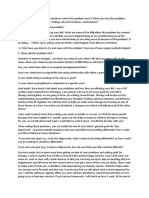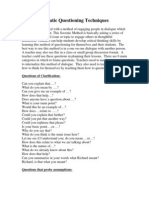Questions For A Socratic Dialogue
Questions For A Socratic Dialogue
Uploaded by
Inami B.Copyright:
Available Formats
Questions For A Socratic Dialogue
Questions For A Socratic Dialogue
Uploaded by
Inami B.Original Title
Copyright
Available Formats
Share this document
Did you find this document useful?
Is this content inappropriate?
Copyright:
Available Formats
Questions For A Socratic Dialogue
Questions For A Socratic Dialogue
Uploaded by
Inami B.Copyright:
Available Formats
Questions for a Socratic Dialogue
Questions of Clarification
• What do you mean by _____?
• What is your main point _____?
• How does _____relate to _____?
• Could you put that another way?
• What do you think is the main issue here?
• Is your basic point _____ or _____?
• Could you give me an example?
• Would this be an example: _____?
• Could you explain that further?
• Would you say more about that?
• Why do you say that?
• Let me see if I understand you; do you mean _____ or _____?
• How does this relate to our discussion/problem/issue?
• What do you think John meant by his remark? What did you take John to mean?
• Jane, would you summarize in your own words what Richard has said? Richard, is that what
you meant?
Questions That Probe Purpose
• What is the purpose of _____?
• What was your purpose when you said _____?
• How do the purposes of these two people vary?
• How do the purposes of these two groups vary?
• What is the purpose of the main character in this story?
• How did the purpose of this character change during the story?
• Was this purpose justifiable?
• What is the purpose of addressing this question at this time?
Questions That Probe Assumptions
• What are you assuming?
• What is Karen assuming?
• What could we assume instead?
• You seem to be assuming _____. Do I understand you correctly?
• All of your reasoning depends on the idea that _____. Why have you based your reasoning
on _____ rather than _____?
• You seem to be assuming _____. How would you justify taking this for granted?
• Is it always the case? Why do you think the assumption holds here?
Questions That Probe Information, Reasons, Evidence, and
Causes
• What would be an example?
• How do you know?
• What are your reasons for saying that?
• Why did you say that?
• What other information do we need to know before we can address this question?
• Why do you think that is true?
• Could you explain your reasons to us?
• What led you to that belief?
• Is this good evidence for believing that?
• Do you have any evidence to support your assertion?
• Are those reasons adequate?
• How does that information apply to this case?
• Is there reason to doubt that evidence?
• What difference does that make?
• Who is in a position to know if that is the case?
• What would convince you otherwise?
• What would you say to someone who said _____?
• What accounts for _____?
• What do you think is the cause?
• How did this come about?
• By what reasoning did you come to that conclusion?
• How could we go about finding out whether that is true?
• Can someone else give evidence to support that response?
Questions about Viewpoints or Perspectives
• You seem to be approaching this issue from _____ perspective. Why have you chosen this
perspective rather than that perspective?
• How would other groups or types of people respond? Why? What would influence them?
• How could you answer the objection that _____ would make?
• Can/did anyone see this another way?
• What would someone who disagrees say?
• What is an alternative?
• How are Ken’s and Roxanne’s ideas alike? Different?
Questions That Probe Implications and Consequences
• What are you implying by that?
• When you say _____, are you implying _____?
• But if that happened, what else would also happen as a result? Why?
• What effect would that have?
• Would that necessarily happen or only probably happen?
• What is an alternative?
• If this and this are the case, then what else must be true?
Questions about the Question
• How can we find out?
• Is this the same issue as _____?
• How could someone settle this question?
• Can we break this question down at all?
• Is the question clear? Do we understand it?
• How would _____ put the issue?
• Is this question easy or difficult to answer? Why?
• What does this question assume?
• Would _____ put the question differently?
• Why is this question important?
• Does this question ask us to evaluate something?
• Do we need facts to answer this?
• Do we all agree that this is the question?
• To answer this question, what other questions would we have to answer first?
• I’m not sure I understand how you are interpreting the main question at issue. Could you
explain your interpretation?
Questions That Probe Concepts
• What is the main idea we are dealing with?
• Why/how is this idea important?
• Do these two ideas conflict? If so, how?
• What was the main idea guiding the thinking of the character in this story?
• How is this idea guiding our thinking as we try to reason through this issue? Is this idea
causing us problems?
• What main theories do we need to consider in figuring out _____?
• Are you using this term “_____” in keeping with educated usage?
• Which main distinctions should we draw in reasoning through this problem?
• Which idea is this author using in her or his thinking? Is there a problem with it?
Questions That Probe Inferences and Interpretations
• Which conclusions are we coming to about _____?
• On what information are we basing this conclusion?
• Is there a more logical inference we might make in this situation?
• How are you interpreting her behavior? Is there another possible interpretation?
• What do you think of _____?
• How did you reach that conclusion?
• Given all the facts, what is the best possible conclusion?
• How shall we interpret these data?
You might also like
- Introspection WorkbookDocument6 pagesIntrospection Workbookdevashish sinha100% (2)
- Solution Focused Brief Therapy QuestionsDocument4 pagesSolution Focused Brief Therapy QuestionsDaiva ValienėNo ratings yet
- High-Mileage Questions: © 2011, 2018 Integrative Nutrition, IncDocument13 pagesHigh-Mileage Questions: © 2011, 2018 Integrative Nutrition, IncGiselle Muhammad100% (1)
- Problem Impact and Picture Perfect QuestionsDocument2 pagesProblem Impact and Picture Perfect QuestionsCarlos NigrinisNo ratings yet
- CBTDocument7 pagesCBTforamNo ratings yet
- Socratic Questioning SheetDocument1 pageSocratic Questioning Sheetjohnson275100% (6)
- The Six Types of Socratic QuestionsDocument3 pagesThe Six Types of Socratic QuestionsZack100% (3)
- Marzano QuestionsDocument7 pagesMarzano QuestionsJoaquin Hernandez100% (6)
- The Six Facets of UnderstandingDocument3 pagesThe Six Facets of UnderstandingRiz GetapalNo ratings yet
- Dcd-I HVDCDocument3 pagesDcd-I HVDCsatya_vanapalli3422No ratings yet
- Taxonomy of Socratic QuestioningDocument2 pagesTaxonomy of Socratic Questioningapi-313303035100% (1)
- Socratic Questioning TechniquesDocument5 pagesSocratic Questioning Techniquesivonelobof100% (3)
- Socratic Questioning TechniquesDocument3 pagesSocratic Questioning Techniquesdiya.dsouza06No ratings yet
- Socratic Questioning Techniques: Questions of ClarificationDocument6 pagesSocratic Questioning Techniques: Questions of Clarificationsunilmba2004No ratings yet
- Probing QuestionsDocument6 pagesProbing QuestionsapurvaapurvaNo ratings yet
- Socratic Questions For WritingDocument1 pageSocratic Questions For WritingHai Duy Nguyen-LeNo ratings yet
- Socratic Question Type ExampleDocument1 pageSocratic Question Type ExampleNishita GuptaNo ratings yet
- Examples of Open Ended QuestionsDocument1 pageExamples of Open Ended Questionsgojuvy18No ratings yet
- Accountable TalkDocument2 pagesAccountable Talkapi-302388352No ratings yet
- Questioning TechniquesDocument6 pagesQuestioning TechniquesDeepaliNo ratings yet
- Math 201Document2 pagesMath 201api-261944401No ratings yet
- Coaching QuestionsDocument3 pagesCoaching QuestionsfajarhumaidyNo ratings yet
- Thinking SkillsDocument16 pagesThinking SkillsRizky NugrahaNo ratings yet
- Becoming A Critic of Your ThinkingDocument13 pagesBecoming A Critic of Your ThinkingPatrick AnthonyNo ratings yet
- 2 - Asking QuestionsDocument19 pages2 - Asking Questionschess ramaNo ratings yet
- Hints and Tips ENG FINALDocument3 pagesHints and Tips ENG FINALjolenebakers0No ratings yet
- Socratic QuestioningDocument2 pagesSocratic QuestioningpyjpyjNo ratings yet
- We Are Teachers Higher Order Thinking 1Document2 pagesWe Are Teachers Higher Order Thinking 1Ahmad zakNo ratings yet
- Therapy QuestionsDocument23 pagesTherapy QuestionshellloooNo ratings yet
- A Guide For Academics - Open Book Exams: What Is It?Document2 pagesA Guide For Academics - Open Book Exams: What Is It?Vishrut PatelNo ratings yet
- FLEX Designing Discussion Questions Using Blooms Taxonomy ExamplesDocument4 pagesFLEX Designing Discussion Questions Using Blooms Taxonomy Examples1930389No ratings yet
- Critical Thinking QuestionsDocument4 pagesCritical Thinking Questionszm695157No ratings yet
- GROW - Great QuestionsDocument3 pagesGROW - Great Questionsmajor5277No ratings yet
- Word MeaningDocument18 pagesWord Meaningapi-240116049No ratings yet
- QuestionsDocument2 pagesQuestionsVishnu KanthNo ratings yet
- Fishbowl Discussion/Socratic Seminar GOALS and NORMSDocument3 pagesFishbowl Discussion/Socratic Seminar GOALS and NORMSapi-244383152No ratings yet
- Critical Thinking: Question To Be Asked For Being Critical ThinkerDocument22 pagesCritical Thinking: Question To Be Asked For Being Critical ThinkerMuhammad Owais AwanNo ratings yet
- Lect 4 Communication Skills For Trauma CounsellorsDocument36 pagesLect 4 Communication Skills For Trauma CounsellorsumibrahimNo ratings yet
- How To Solve Problems Using Empowering QuestionsDocument4 pagesHow To Solve Problems Using Empowering Questionssmeraldabree100% (1)
- Questioning Skills Ereport - Dr. Tony Alessandra PDFDocument13 pagesQuestioning Skills Ereport - Dr. Tony Alessandra PDFRey DavidNo ratings yet
- Critical ThinkingDocument6 pagesCritical ThinkingParveen BushraNo ratings yet
- Solution Focus TrainingDocument30 pagesSolution Focus TrainingLaurent TanNo ratings yet
- Phrases For COT ConsultationsDocument2 pagesPhrases For COT ConsultationsoluseyeNo ratings yet
- Guided Reading QuestionsDocument7 pagesGuided Reading QuestionspaulineNo ratings yet
- Article About Guidance and Counseling - 0006 & 0014Document2 pagesArticle About Guidance and Counseling - 0006 & 0014kiescoo358No ratings yet
- Unit 4 (GMT)Document5 pagesUnit 4 (GMT)mekaal2024No ratings yet
- Solution Focused TechniquesDocument5 pagesSolution Focused TechniquesNazario Israel Narvaez ArzateNo ratings yet
- The FortyTwo : Questions to find yourself and the path to your best lifeFrom EverandThe FortyTwo : Questions to find yourself and the path to your best lifeNo ratings yet
- Tips For Effective JournalingDocument2 pagesTips For Effective JournalingaNo ratings yet
- Questioning Skills GridDocument1 pageQuestioning Skills GridEman Mo'at GajoNo ratings yet
- Critical Thinking Module II Part 2Document40 pagesCritical Thinking Module II Part 2Vibha HegdeNo ratings yet
- RS 2009 QuestionsToUseDocument1 pageRS 2009 QuestionsToUseMagna NegreirosNo ratings yet
- Vanessa Van Edwards - Questions Every Couple Should AnswerDocument7 pagesVanessa Van Edwards - Questions Every Couple Should AnswerMargot1961No ratings yet
- Lindsay Dotzlaf Coaching Tools - QuestionsDocument5 pagesLindsay Dotzlaf Coaching Tools - QuestionsStefani MartinezNo ratings yet
- Blooms Question StemsDocument1 pageBlooms Question Stemsapi-263656720No ratings yet
- Powerful Questions For Coaching Your Clients and Group Participants Main Coaching QuestionsDocument4 pagesPowerful Questions For Coaching Your Clients and Group Participants Main Coaching QuestionsBianca Elena MateiNo ratings yet
- 100 Commonly Asked Interview QuestionsDocument1 page100 Commonly Asked Interview QuestionsDeepak DassNo ratings yet
- ThoughtlogDocument3 pagesThoughtlogapi-341007152No ratings yet
- A Bank of Massively Difficult Questions v1.0 Jan 2011 - (1)Document8 pagesA Bank of Massively Difficult Questions v1.0 Jan 2011 - (1)Cristina Manuela MitricaNo ratings yet
- Critical Thinking Arguments Premises ConclusionsDocument39 pagesCritical Thinking Arguments Premises Conclusionssiddiquimahrukh82No ratings yet
- Ask Better Questions Build Better Relationships: Asking Questions Connects And Engages & Strengthens Our Relationships Good Questions Reduce Tension & ConflictFrom EverandAsk Better Questions Build Better Relationships: Asking Questions Connects And Engages & Strengthens Our Relationships Good Questions Reduce Tension & ConflictNo ratings yet
- 2014 - Rita Barbuto - Womenwithdisabilitiesfromdiscriminationandviolence (Retrieved 2021-04-29)Document8 pages2014 - Rita Barbuto - Womenwithdisabilitiesfromdiscriminationandviolence (Retrieved 2021-04-29)Inami B.No ratings yet
- Place of Articulation: Chapter OutlineDocument18 pagesPlace of Articulation: Chapter OutlineInami B.No ratings yet
- Voice: Chapter OutlineDocument12 pagesVoice: Chapter OutlineInami B.No ratings yet
- 01.0 PP 1 20 Introduction To SpeechDocument20 pages01.0 PP 1 20 Introduction To SpeechInami B.No ratings yet
- Class04 Chemistry G11 Homework Sep 25-29Document4 pagesClass04 Chemistry G11 Homework Sep 25-29Erin100% (1)
- Self-Concept and Self-Esteem in Adolescents NASSP Feb 07 PDFDocument5 pagesSelf-Concept and Self-Esteem in Adolescents NASSP Feb 07 PDFAndra AndruNo ratings yet
- Attached To Decision No. 652 /QD-ĐHNN, Dated April 9, 2015 of The President of ULIS-VnuDocument2 pagesAttached To Decision No. 652 /QD-ĐHNN, Dated April 9, 2015 of The President of ULIS-VnuThảo HươngNo ratings yet
- PR 1Document29 pagesPR 1kiel sosaNo ratings yet
- Crucial Bx500 SSD ProductflyerDocument2 pagesCrucial Bx500 SSD Productflyervinothagan777No ratings yet
- First Grade Math Homework MenuDocument6 pagesFirst Grade Math Homework Menuafetoeszs100% (1)
- Chemistry (Determination of Contents of Cold Drinks) - 1Document22 pagesChemistry (Determination of Contents of Cold Drinks) - 1StudenrtNo ratings yet
- Mónica Poza Diéguez: EducationDocument4 pagesMónica Poza Diéguez: EducationmonicapozaNo ratings yet
- Salt Removal Effect by Fine BubblesDocument4 pagesSalt Removal Effect by Fine BubblesSCR_010101No ratings yet
- Principles of Interior Design-20 Jan-11Document9 pagesPrinciples of Interior Design-20 Jan-11Sandip Ghadge100% (1)
- Cryptography Overview: John MitchellDocument87 pagesCryptography Overview: John MitchellWIBF KevinNo ratings yet
- Project Proposal CWTSDPMDocument6 pagesProject Proposal CWTSDPMJacel Reinard ArceoNo ratings yet
- Study Guide Template EDITEDDocument5 pagesStudy Guide Template EDITEDRico EsponillaNo ratings yet
- Monetary PolicyDocument13 pagesMonetary PolicyAppan Kandala VasudevacharyNo ratings yet
- Ug903 Vivado Using ConstraintsDocument152 pagesUg903 Vivado Using ConstraintsJenniferNo ratings yet
- Activity N°2 - School PlacesDocument11 pagesActivity N°2 - School PlacesMarian SofíaNo ratings yet
- ERP Implementation and E-BusinessDocument26 pagesERP Implementation and E-BusinessDev GuptaNo ratings yet
- Invoking The Power Within V3-3Document53 pagesInvoking The Power Within V3-3Monique Duijn100% (3)
- CombinepdfDocument67 pagesCombinepdfNguyen Thi Anh TrangNo ratings yet
- FINA201 Topic 3 CH 6 Slides Valuations and Bonds PrintingDocument8 pagesFINA201 Topic 3 CH 6 Slides Valuations and Bonds Printingayushmaharaj68No ratings yet
- Soundworks BrochureDocument12 pagesSoundworks BrochureMiteshaNo ratings yet
- Detailed Lesson Plan Science Kindergarten 2 Prepared By: Joharah Tindegaranao Dumangcag I. ObjectivesDocument4 pagesDetailed Lesson Plan Science Kindergarten 2 Prepared By: Joharah Tindegaranao Dumangcag I. ObjectivesJoharah DumangcagNo ratings yet
- Kinetics - The Maxwell-Boltzmann Distribution and Catalysts (A-Level Chemistry) - Study MindDocument25 pagesKinetics - The Maxwell-Boltzmann Distribution and Catalysts (A-Level Chemistry) - Study MindkeysNo ratings yet
- Damping MeasurementsDocument50 pagesDamping MeasurementsWon-young Seo100% (1)
- BioEnergy VKKDocument24 pagesBioEnergy VKKdane05No ratings yet
- TERM PAPER - DBMS NDocument5 pagesTERM PAPER - DBMS NMD ShohagNo ratings yet
- Exxon Mobil New Refinery TrendsDocument45 pagesExxon Mobil New Refinery TrendsWong Yee Sun100% (1)
- Merging Multimedia, Controls and Plug - Ins WithDocument17 pagesMerging Multimedia, Controls and Plug - Ins Withammu_20130% (1)
- Bectel ASME Process Cal R2Document21 pagesBectel ASME Process Cal R2Sivakumar SelvarajNo ratings yet





























































































